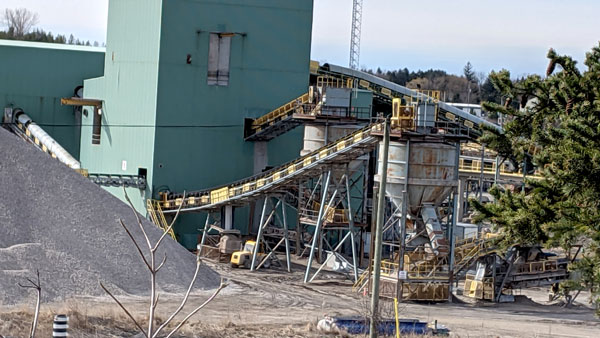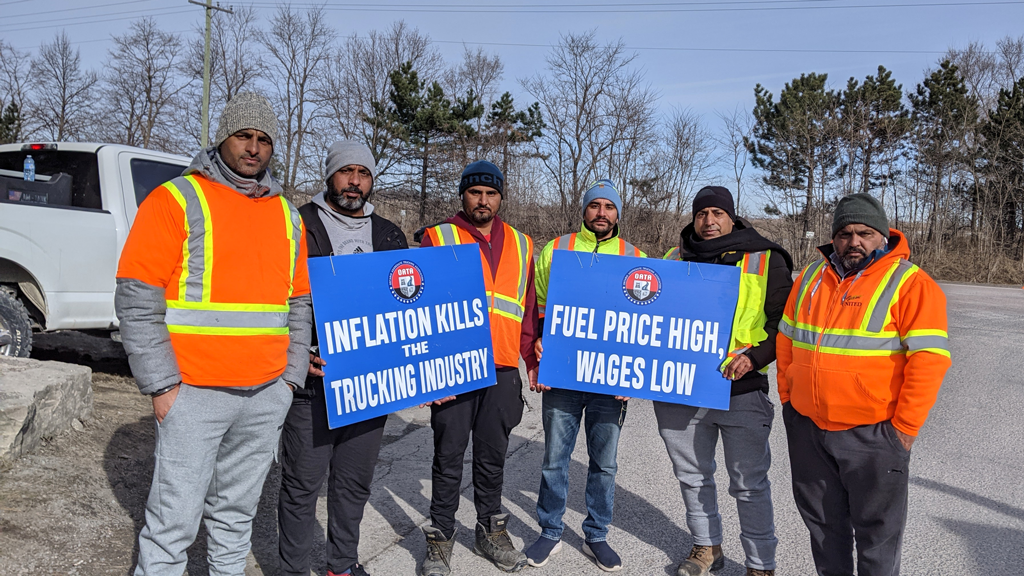There’s no end in sight to an impasse between aggregate haulers and producers that is causing delays in deliveries of ready-mix concrete to Ontario construction sites, with project shutdowns a possible imminent next step.
The dispute, prompted by rising costs, especially for diesel fuel, involves multiple players large and small, from aggregate suppliers such as Lafarge and Dufferin to modest-sized trucking owner-operators who are seeing savings dwindling as protests continue.
Executives from nine stakeholder construction associations conferred throughout the week looking for solutions after issuing a plea to Premier Doug Ford suggesting regulatory changes that would mitigate the impact of rising costs in the sector.
“Our combined organizations are still working through the issue since there is no clear resolution in sight,” said Giovanni Cautillo, president of the Ontario General Contractors Association.
Members of the Ontario Aggregate Trucking Association (OATA) have been disrupting access to quarries owned by Lafarge, Dufferin and other firms across the Greater Toronto and Hamilton Area since March 14. Aggregate haulers move aggregate to concrete and asphalt plants which then supply jobsites.
Drivers and owner-operators protesting at two quarries in Hamilton this week were observed blocking the path of other haulers leaving the sites for about 10 minutes before letting them leave.
Other truckers who contract with excavation contractors to haul excavated materials away from project sites, members of the Ontario Dump Truck Association, are protesting at jobsites as well.
“We are seeing impacts now,” said Patrick McManus, executive director of the Ontario Sewer and Watermain Association. “It is certainly spreading quite quickly.”
The effects of the withdrawal of dump truck services is having minimal impact so far, McManus said, but it will be a bigger deal if it lasts much longer given that they represent a significant percentage of the trucks used in the excavation industry.
As for the aggregate job action, Concrete Ontario president Bart Kanters said in a statement the protest is causing “massive disruptions” to the ready-mix concrete supply chain.
“A significant number of construction projects in the GTA are not receiving ready mixed concrete, and jobsites are likely to be shut down since ready mixed concrete is an essential construction material for almost every type of project,” stated Kanters.
“These concrete plant and jobsite shutdowns will lead to worker layoffs and significant disruptions to major infrastructure projects.”

OATA members say they have not received increases in their rates for many years despite frequent requests and in that time they have had to deal with the rising cost of trucks, from $80,000 to $330,000, one said, and hikes in insurance, the cost of living, drivers’ wages and most significantly lately, diesel fuel. The cost of diesel has tripled since April 2020 and doubled in the past year.
OATA president Jagroop Singh wrote to the suppliers over a month ago saying, “Our association believes if there’s not a 20-per-cent increase in rates within the next six months, 40 per cent of truckers will have to exit the market due to financial reasons.”
Complicating negotiations is the involvement of subcontractors hired by hauling firms, independent drivers and brokers.
Cautillo said, “The crux of the issue is that the aggregate suppliers and the dump truck operators mostly work through brokers and not directly with the quarry or general contractors.
“Even if the quarries and generals were to increase the payments to the threshold that the truckers are demanding, the monies are still moving through the broker who holds the contract with the quarry or general.”
Lafarge issued a statement explaining agreements with its hauling companies are the result of direct negotiations with each individual hauler and that it would not divulge terms.
“However, we can clarify that we renegotiate our haul rates annually with our haulers on an individual basis – the latest round of renegotiations took place in February,” said the statement.
Lafarge said it recognizes that current fuel volatility is putting pressure on businesses, and that “Suppliers and haulers must be able to discuss and solve matters through individual negotiations with clear dialogue to address individual concerns. For instance, we must be clear in our contracts with our individual haulers about how we are measuring fuel volatility…and how we are compensating them individually.”
Meanwhile, standing outside the gates of the Lafarge quarry in Dundas, north Hamilton, Gurprett Singh, an owner-operator from Brampton with two trucks, explained how the numbers no longer add up for him and his colleagues.
“When we go to downtown Toronto it takes 16 hours for four loads,” he said. “When we calculate per hour it’s like $15 per hour.
“When you spend $330,000 on your truck and you make $15 per hour as a driver, is it worth it?”
His brother Dhami Singh, also an owner-operator, said he had a $50,000 line of credit on each truck that he was eating into: “I am wondering if I stay in this industry too long, I may lose my house too…I am working a 12- or 13-hour workday, and not even bringing one cent in my house.”
Construction stakeholder association executives were planning another meeting looking for solutions on March 23.
Follow the author on Twitter @DonWall_DCN.











Numbers don’t lie,
Have we the accurate numbers on the table, and have we all the right people at the table?
With so many hard working people involved, you would think this issue would be resolved upon review and clarity!
From the Board Rooms to the Truck Cabs of the dump trucks, bring your collective efforts together with positive levels of communication.
Keep our economy building!
Kindest regard to everyone, for a peaceful and mutual resolution as we all meet the challenges of today!
Bobby Bates
What’s the outcome now? Is this resolved yet? As an aggregate driver going to Hamilton tomorrow, this is stuff I need to know.